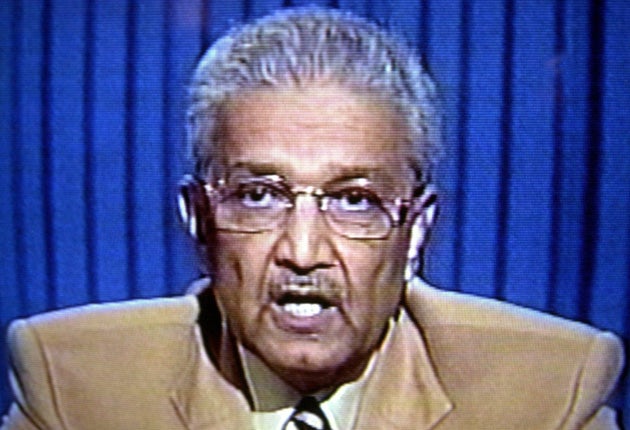Pakistan's nuclear 'godfather' in new inquiry
Reports link AQ Khan to attempts to sell nuclear secrets to Iraq and Iran

The Pakistan government has said it wishes to question the shamed nuclear scientist A Q Khan over fresh claims that he tried to sell nuclear weapon technology to both Iraq and Iran.
In a petition before a court in Lahore, the government applied for permission to interrogate the "godfather" of the country's nuclear programme and prevent him from further speaking publicly about sensitive issues. The move follows the recent publication of two articles in a US newspaper which provided further details to longstanding allegations that Dr Khan – with the knowledge of the Pakistan military – was involved in efforts to illicitly transfer the technology to Iran and Iraq.
The articles claimed Iranian officials had approached Pakistan in the late 1980s and sought the nuclear know-how, and Saddam Hussein was offered the technology by an intermediary of Dr Khan in 1990.
The reports in The Washington Post said although the Iraqi dictator did not agree to the deal, blueprints were sold to Iran. It has long been claimed that nuclear technology now possessed by Iran came from Pakistan, but the authorities have always tried to project Dr Khan as a rogue operator, acting alone for money.
"We basically seek permission to see Dr Khan and investigate the matter as well as restrain him from making any statement and interacting with anybody," Naveed Inayat Malik, a government lawyer, told Reuters. The case was adjourned until tomorrow.
This week, a Pakistani delegation headed by the Foreign Minister, Shah Mahmood Qureshi, is in the US for what are seen as crucial strategic talks. It is widely expected that Pakistan, beset by crippling power shortages, will seek an agreement from Washington to develop a civilian nuclear deal, similar to the one that was agreed with India in 2008.
The 73-year-old Dr Khan, who confessed in 2004 that he had sold proscribed nuclear technology to Iran, North Korea and Libya, is challenging restrictions imposed on him by the authorities. The day after his televised confession, he was pardoned by the country's then military ruler, General Pervez Musharraf, and placed under house arrest.
But Dr Khan has since retracted his confession and claimed that General Musharraf was trying to use him as a scapegoat. Last year, a court ruled that the scientist should be released from house arrest and although the government relaxed many of his restrictions, it sought to block him from speaking to the media on the issue of nuclear proliferation. Ironically, while under house arrest he was allowed to write a column for a Pakistani newspaper.
Many observers believe that the desire of the Pakistani authorities to restrict the scientist's public utterances and their refusal to allow him to be questioned by US investigators, is because of the central role of the government in organising and overseeing the nuclear trade.
"We know with cast-iron certainty that Pakistan made nuclear deals with several countries," said Sean Gregory, professor of international security at the University of Bradford. "[That was when] it was short of cash and diplomatically isolated. We also know that the Pakistani military and the intelligence services gave A Q Khan the green light to go out into the world and get whatever it took to build Pakistan a nuclear weapon. The idea that at a later stage he goes off the radar is just nonsensical."
With many of the country's cities suffering chronic power-cuts of more than 12 hours a day, Pakistan is desperately keen to secure a nuclear power deal. In recent weeks, the US, which has long expressed its concerns about the dangers of proliferation if such technology were to be shared, appears to have softened its stance. The US ambassador in Islamabad recently said that "working level" talks on the issue were on for this week.
*Pakistani officials say two experienced Taliban militants have been arrested while planning to attack top hotels and kidnap diplomats. One of the men claims to have helped plan previous attacks.
Atom thief: The AQ Khan story
*Although A Q Khan is considered a dangerous nuclear proliferator by the West, he remains revered in Pakistan as someone who helped the country achieve its ambition of matching its rival India in the arms race.
As a mid-ranking scientist during the 1970s at Urenco, the Dutch-based consortium that developed various integral components for the nuclear industry, Dr Khan was able to steal blueprints and return to Pakistan with his Dutch wife where the military authorities threw money and resources into efforts to develop a weapon.
After India unofficially tested a device in 1974, Pakistan was determined to match it, with Ali Bhutto, who was Prime Minister at the time, saying the aim would be achieved even if Pakistanis had to "eat grass".
As it was, on 28 May 1998, shortly after India detonated its second nuclear bomb, Pakistan successfully exploded its own weapon.
Join our commenting forum
Join thought-provoking conversations, follow other Independent readers and see their replies
Comments
Bookmark popover
Removed from bookmarks